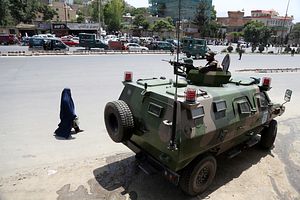After renouncing war, a gathering of clerics in Afghanistan’s capital Kabul was attacked by a suicide bomber on Monday.
About 2,000 Muslim clerics, scholars, and other notable figures in religion and law in the country gathered Monday at the Loya Jirga (Grand Assembly) tent on the grounds of Kabul Polytechnic University. A suicide bomber reportedly on foot attacked the gathering as it came to a close, killing 14, according to Afghan media on Tuesday, and injuring at least 17 others.
The gathered clerics had just issued a fatwa — a religious order — denouncing the ongoing war in Afghanistan. “The ongoing war in Afghanistan is forbidden under the Islamic law,” the fatwa declared, going on to argue that “war in its all types is forbidden under the Sharia and Islamic law and it is nothing but shedding the blood of Muslims.”
The fatwa specifically highlighted suicide bombings, insurgency, corruption, robbery, kidnapping and violence as sins.
According to Al Jazeera‘s Jennifer Glasse, “The gathering had just finished and the clerics were coming out of the tent when that suicide bomber went off.”
“They had just come to an agreement saying that suicide bombing was un-Islamic,” she said.
The Islamic State claimed responsibility for the attack via its Amaq news agency, identifying the suicide bomber as Siddiq al-Farsi. The statement reportedly claimed that the attack killed or wounded about 70 people. The Islamic State often claims attacks without much supporting evidence and frequently inflates the impact of those attacks.
Given that both the Taliban and the Islamic State couch their violence in religious terms — calling it a holy war against foreign invaders, for example — clerics which renounce such groups and their tactics are branded traitors. As The New York Times notes, “Hundreds of religious scholars who have sided with the government or have openly denounced the Taliban since the group was ousted from power in 2001 have met a grim end. Such targeted violence has led many clerics — even those appalled by the bloodshed waged in the name of Islam — to keep quiet.”
But the Afghan government values the backing such clerics and scholars can provide, a religious undergirding of their own. After the attack, President Ashraf Ghani said in a video statement that “In the context of the current situation in Afghanistan and this holy month of Ramadan, our respected Ulema [a body of Muslim scholars] have done a great job, which I would like to thank them on behalf of government and the people of Afghanistan with full sincerity.”
He went on to say, “The attack that targeted the large gathering of clerics and religious scholars from across the country was in fact an attack against the heirs of the prophet of Islam and the values of Islam.” He called on the Taliban to stop fighting.
Tolo News reported that the Taliban, which denied involvement in the attack, dismissed the fatwa, calling it “American and symbolic.”
Maulavi Shafiullah Nuristani, a member of the government’s High Peace Council and an attendee at the gathering Monday told The New York Times, “We knew about the risks, but we, as scholars, thought it is more important to hold the gathering despite all the risks because attaining peace is our prime objective… Nothing can stop us — not these attacks or anything else. We are ready to do our best to achieve peace.”
The Times also reported that Afghan officials said prominent cleric Abdul Haq Akhundzada, who led a mosque in Kandahar for 20 years, was shot to death on Monday as well. Akhundzada, the Times writes, was a supporter of the government’s push for peace.

































